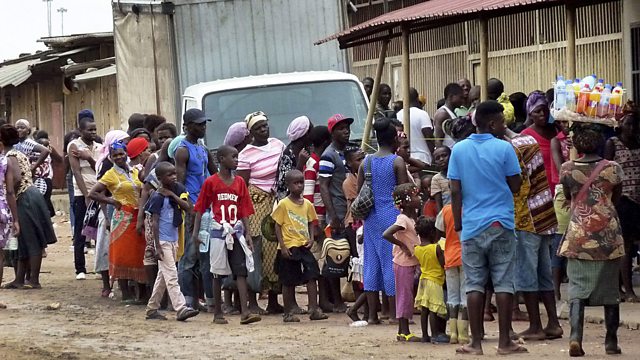Yellow Fever Outbreak in Angola Worsens Vaccine Shortage
More than six million doses of yellow fever vaccine have been given so far as the outbreak in Angola continues – but can supply keep up with demand?
The outbreak of yellow fever in the African state of Angola – where 242 people have died - has now spread to neighbouring Democratic Republic of Congo. There is an effective vaccine that prevents yellow fever and a huge vaccination programme in Angola has already inoculated six million people. But there are just four facilities in the world producing the vaccine which is still made from an 80 year old method, using hens’ eggs. Some fear that the demand for the vaccine will outstrip supply but William Perea, who’s the coordinator of the Control of the Epidemic Diseases Unit at the WHO says they are confident that they have enough.
Some of the folklore about health turns out to be true – but there are some myths too. This week sleep expert Matthew Walker, who’s Professor of Neurology at University College London, explains whether it’s a good or bad idea to exercise just before you go to bed.
One in three children who live in Cameroon are malnourished – which causes stunting and ill health. The larvae of the Africa palm weevil are a good source of nutritious protein. But in the past harvesting them from forests has meant cutting down the raffia palms where they live, destroying much of their habitat. But now scientists have found a more environmentally-friendly way of cultivating the grubs – which are creamy in colour, about the size of an adult thumb and with a black stump as a nose. In the markets of the capital Yaounde, the grubs are selling for record prices – around 5 US dollars for a small pot containing 10 grubs. this morning looking for palm weevil grubs – making them more expensive than chicken or fish. John Moufor, the founder of the Living Forest Trust charity, keeps the palm weevil larvae in plastic boxes with some raffia palm. In four weeks’ time they are ready to eat – either raw or cooked. One of the pilot projects he is supervising to farm the grubs is in Obout, a small village 3 hours’ drive from the capital. Michel Tsoungui used to be a grub hunter – now he’s a grub farmer he can make more money and save time because he doesn’t have to travel to the forest. The village nurse in Obout, Mbede Dioudone, says that palm weevil grubs are a complete food and if everyone ate grubs there wouldn’t be any malnutrition. Michel’s children wait patiently while his wife places a bowl of freshly cooked grubs in front of them – seasoned with local spices. If the pilot project is successful the grub farming methods could be used across sub-Saharan Africa.
Every day in the United States 91 people die from gun violence.
Scientists are keen to reduce this toll – by understanding who is most at risk of gun violence such as victims of domestic violence or children who accidentally fire a gun they find at home. But an amendment passed 20 years ago blocks government funding of such research, which used to be carried out by the Centers for Disease Control and Prevention. Now doctors and medical professionals are campaigning to change the law. A coalition of 141 medical organisations has sent a letter to that effect. Alice Chen, who’s the Executive Director of Doctors for America as well as a practising physician, believes that if research was allowed it would save lives.
(Photo: A huge Yellow Fever vaccination programme is underway in Angola and already six million doses have been given. Credit: EPA)
Last on
More episodes
Broadcasts
- Wed 13 Apr 2016 21:32GMT91�ȱ� World Service except East and Southern Africa, 91�ȱ� World Service Core, 91�ȱ� World Service ANR & 91�ȱ� World Service US Public Radio
- Thu 14 Apr 2016 01:32GMT91�ȱ� World Service Americas and the Caribbean
- Thu 14 Apr 2016 02:32GMT91�ȱ� World Service Online, UK DAB/Freeview & Europe and the Middle East only
- Thu 14 Apr 2016 03:32GMT91�ȱ� World Service East Asia, South Asia & News Internet only
- Thu 14 Apr 2016 04:32GMT91�ȱ� World Service Australasia
- Thu 14 Apr 2016 06:32GMT91�ȱ� World Service East and Southern Africa & Europe and the Middle East only
 Thu 14 Apr 2016 07:32GMT91�ȱ� World Service US Public Radio
Thu 14 Apr 2016 07:32GMT91�ȱ� World Service US Public Radio Thu 14 Apr 2016 11:32GMT91�ȱ� World Service ANR
Thu 14 Apr 2016 11:32GMT91�ȱ� World Service ANR- Thu 14 Apr 2016 14:32GMT91�ȱ� World Service, 91�ȱ� World Service Core & 91�ȱ� World Service US Public Radio
 Thu 14 Apr 2016 17:32GMT91�ȱ� World Service ANR
Thu 14 Apr 2016 17:32GMT91�ȱ� World Service ANR Sat 16 Apr 2016 09:32GMT91�ȱ� World Service US Public Radio
Sat 16 Apr 2016 09:32GMT91�ȱ� World Service US Public Radio Sat 16 Apr 2016 19:32GMT91�ȱ� World Service US Public Radio
Sat 16 Apr 2016 19:32GMT91�ȱ� World Service US Public Radio- Sun 17 Apr 2016 19:32GMT91�ȱ� World Service East and Southern Africa
Podcast
-
![]()
Health Check
Health issues and medical breakthroughs from around the world.


